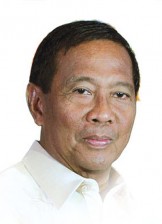MANILA Philippines–Vice President Jejomar Binay on Thursday urged socialized housing developers to help in the relocation efforts for informal settlers heavily affected by floods, saying that they need to be relocated in “safe” and “sustainable” areas to help mitigate the effects of climate change.
“The urgent need now is to relocate the affected families not only to safe locations but also to areas which provide basic services and a sustainable environment,” Binay said.
Binay spoke at the 2012 National Convention of the Organization of Socialized Housing Developers of the Philippines (OSHDP) in Muntinlupa City.
“It is also our priority to remove informal settler families (ISFs) from danger areas,” he said.
Binay also highlighted the role of socialized housing developers in the construction of “sustainable housing” units for the poor, and that private sector developers, local government units, and urban planners must work with local and international organizations to develop new approaches to creating housing units “in the light of climate change.”
“We must now do not just housing but sustainable housing. And sustainable because it is meant to respond to climate change, to mitigate its effects, and as a means to progress,” Binay said.
Binay added that the housing sector was developing local government policies that would engage the poor in participating in efforts to create climate-resilient cities by tapping them to identify the risks, as well as the needs of vulnerable sectors like women, children, and elderly during calamities.
He added that the government was also adopting the Accreditation of Indigenous Technologies (AITECH), a project which he said would promote the use of indigenous and green technology in construction of housing units.
“Such technologies must help make social housing eco-friendly, as much as bring down costs. And you can be assured that, one, we will support the developers with innovative solutions; and two, we will educate the communities they serve about the importance of sustainable living,” Binay said.
Binay also said that plans were in the works for a project called the “Working People’s Shelter Program.” He also revealed plans of a program, called “The Working People’s Shelter Program”, which he said would lead to the construction of more houses for the poor.
In explaining the program, Binay said that the project would involve private partner or employers who would advance Pag-ibig Fund membership dues and guarantee payment of housing units.
He said that a developmental loan would be released by the Pag-Ibig fund to the employer, who would then engage a private developer to undertake housing construction or a scheme of retail loan to the buyer or employee.
“If the beneficiary fails to pay, the employer buys back the housing unit and commits to replace the buyer or employee,” Binay said.
He added that the program would provide for “greater convergence” where stakeholders would work together while “mutually benefiting from the program.”
